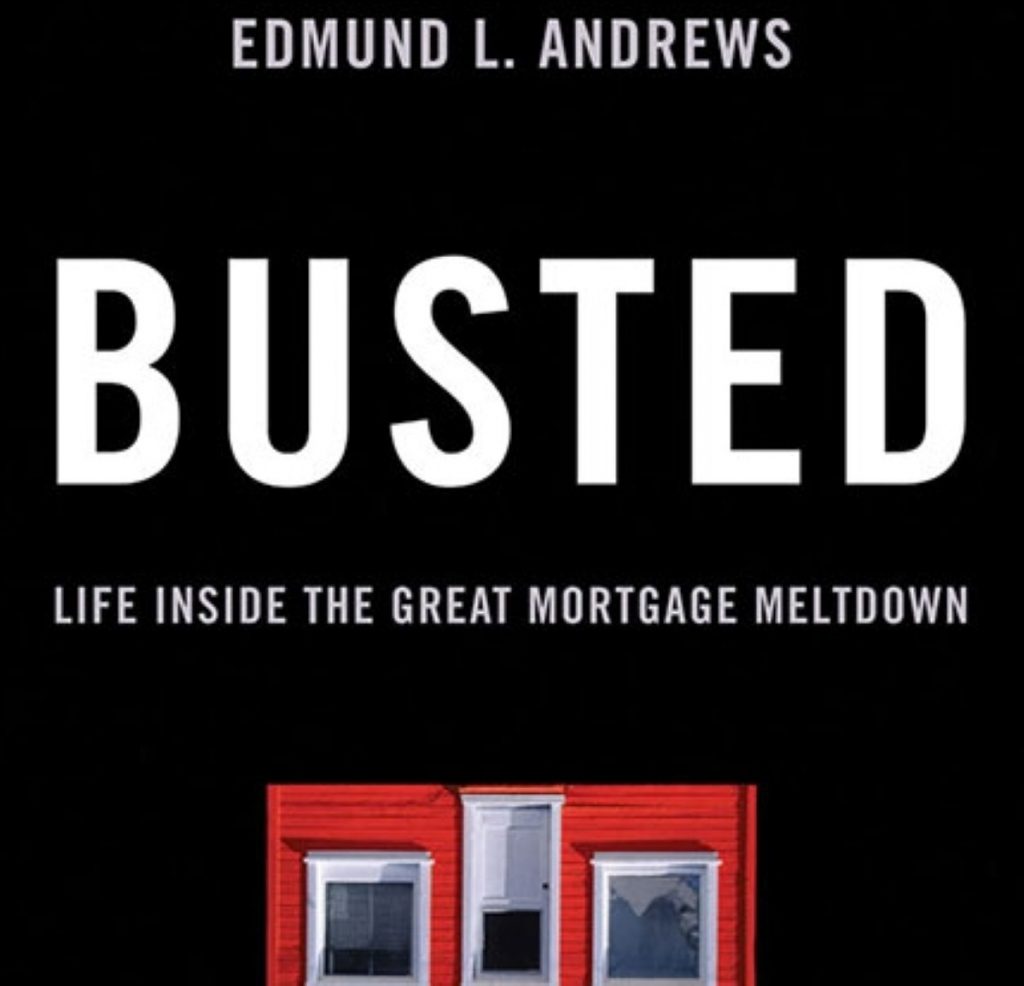Review: Busted – Life Inside the Great Mortgage Meltdown
This semi-confessional tale from a journalist stung by America’s mortgage mayhem is a distinctly sub-prime offering, finds Marcus Dubois.
Busted – Life Inside the Great Mortgage Meltdown, by Edmund L. Andrews
W.W.Norton, £16.99, pp240
Review by Marcus Dubois


Sub-prime. Voted word of the year by the linguists of the American Dialect Society in 2007, this had to be the only occasion on which the mention of the word drew acclaim. Overnight the phrase became the watchword for reckless lending as the US housing market began to be hit by a huge series of repossessions. Graphs were produced and borrowing habits analysed as the housing bubble popped, yet the crash was often presented as an overnight phenomenon. And while banks and mortgage firms received the brunt of criticism, there were questions still to be asked about the gamble on a personal level.
The importance of the personal narrative in today’s news reporting is something that would not have been lost on Edmund L. Andrews. The author of Busted: Life Inside the Great Mortgage Meltdown is an economics reporter of sixteen years standing for the New York Times. As such, he is well versed in the challenge of presenting complex stories in a reader-friendly format. And there is little more accessible than using a personal story to illustrate a national tragedy or major news story.
Which is why Andrews is to be initially commended for opening up his life, using his cautionary tale to illustrate the greater story of the mortgage crisis. The title Busted might refer to both his financial status by the end of the book, and the state of America’s housing market. It works on both the micro level (his surreal journey into easy mortgages and the edge of bankruptcy) and the macro (his story mirrors the obliviousness of the lenders, Wall Street bankers and policymakers).
From the outset his self-flagellation appears unflinching when examining his financial mistakes. ‘Why did you do it?’ asks an economist at his book launch. When the ‘economist’ happens to be Alan Greenspan, the former head of the Federal Reserve and a man dubbed ‘maestro’ by his financial peers, the earth surely could not open up faster. It is the equivalent of a man being dressed-down by Sir Alex Ferguson after the Manchester United manager happened to spot a bad tackle in a Sunday League game.
The answer he gives to Greenspan reveals a worrying line of thought, a philosophy that perhaps is at the root of the collapse. “Shouldn’t the Fed or some other government regulator have stopped them from lending to someone like me?” he asks, deflecting personal responsibility.
And so within three pages we are shown the mindset. Andrews is incapable of answering Greenspan’s question because the reason lies in the emotional, rather than financial domain. ‘Love’ is the answer to many of the questions posed, and it is of the head-spinning variety. Dismissing his first marriage as dead, he comes across childhood friend Patty. Both leave their long-term spouses and “proudly risked everything to be together” he writes, flush with excitement.
“The fever for romance and the speculative fever to get rich have a lot in common,” believes Andrews, an admission which he lives up to with incredulous behaviour. Firstly, he proposes to Parry within months – before they have even kissed (the proposal takes place over the phone). He then immediately offers half a million dollars for a house he has never viewed.
“A glorious gamble” is how Andrews sees it. What he appears not to see is why he was prepared to take risk. A token question is posited: “Why had I tried to keep up the image of a conventional suburban family man, when nothing about my situation was conventional?” This, along with most of his questions, are never answered directly, but one need look no further than his blind passion for Patty. “She was brainy, regal, sexy, fiery and eclectic” he gushes, as if this is everything we need to know in the face of such careless financial abandon.
Perhaps it is. Few analyses of the housing fiasco in America have properly taken into account the human factors behind why decisions are made. Andrews seems at first to be providing a lightning rod for similar sufferers, taking responsibility by showing the behaviours that can lead to such risk.
Yet like a magician or politician, it appears Andrews only reveals the side he wishes to show. The Internet has been awash with criticism when it was revealed in The Atlantic how the story was airbrushed for publication. It transpires that his wife Patty Barreiro had declared bankruptcy twice, once during the marriage itself. Megan McArdle writes: “Serial bankruptcy is not a creation of the current credit crisis and it doesn’t just happen to anyone, particularly anyone with a six-figure salary”. It is hard to argue with this, and easy to see why Andrews would have left this out in his ‘tell-all’.
Omissions aside, the book falls down chiefly on the writing, which is clumsy and earnest at best. He writes of wife Patty that “she had touched my soul in ways I couldn’t really understand” as if songwriting for R.Kelly’s next album. Similar banalities abound in what is a rushed narrative cynically designed as a personal bailout.
Bringing a personal tale to bear on the great financial story of the decade would have been a welcome move. Unfortunately, in an era when the internet can expose truths in a flash, Busted will always remain a story half-told.
As CBS reporter Edward R. Murrow said: “To be persuasive we must be believable; to be believable we must be credible; to be credible we must be truthful.”

